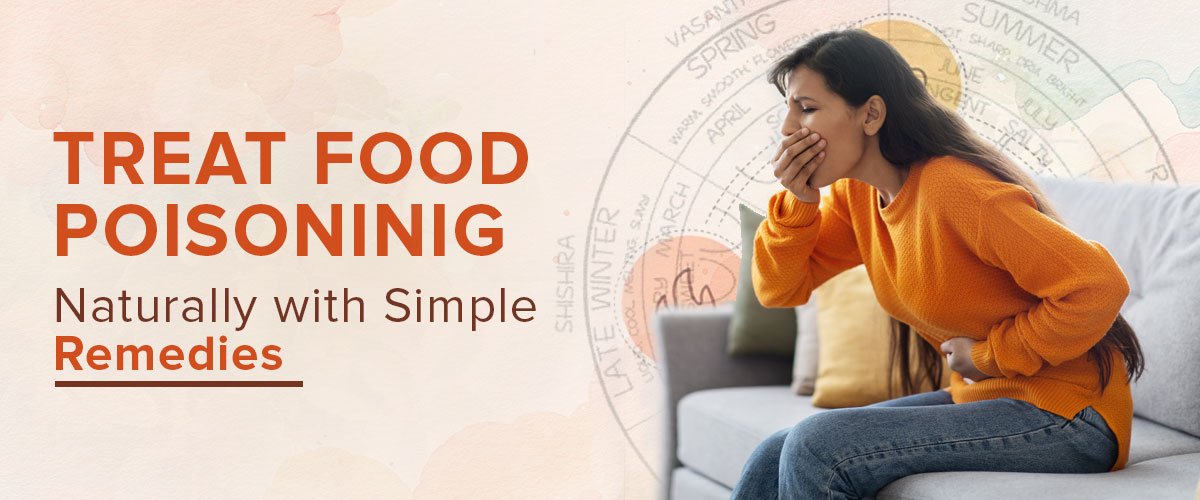Home Remedies for Food Poisoning

Food poisoning can be an unpleasant and distressing experience, often catching us off guard after a meal that didn’t sit well. Whether it’s caused by contaminated food, bacteria, or viruses, the symptoms—nausea, vomiting, diarrhoea, and stomach cramps—can be highly uncomfortable and disruptive.
Although medical attention is necessary in serious cases of food poisoning, mild to moderate cases can usually be managed at home with home remedies. In this article, we will discuss some of the time-tested and easy to prepare home remedies that can help ease your symptoms and speed recovery. Continue reading to learn what practical solutions might provide relief from food poisoning.
What is food poisoning?
Food poisoning occurs when you consume contaminated food or beverages. This contamination is often caused by harmful bacteria, viruses, parasites, or toxins that compromise the safety of what you eat. Common culprits include Salmonella, E. coli, and Listeria. Symptoms can appear within hours or days and typically include nausea, vomiting, diarrhoea, abdominal cramps, and fever.
Although food poisoning is generally mild and resolves on its own, severe cases may lead to dehydration or complications, requiring medical care. Understanding its causes and symptoms is key to taking preventive measures and ensuring a speedy recovery.
What causes food poisoning?
Food poisoning occurs when you consume food or beverages contaminated with harmful microorganisms, toxins, or chemicals. These contaminants can enter food at any stage, from production to preparation or storage. Some of the main causes of food poisoning include:
1. Bacteria
Bacteria like Salmonella, E. coli, and Listeria are leading culprits. They thrive in improperly cooked or stored foods, including raw meat, poultry, seafood, and dairy products. Leftover food kept at unsafe temperatures also fosters bacterial growth.
2. Viruses
Viruses such as norovirus and hepatitis A can contaminate food through infected food handlers or contaminated water. These are often linked to raw shellfish, unwashed produce, and undercooked meals.
3. Parasites
Parasites like Toxoplasma gondii and Giardia are less common but can linger in contaminated food or water. They often result from consuming undercooked meat or unwashed fruits and vegetables.
4. Toxins and Chemicals
Bacteria like Clostridium botulinum can produce toxins in improperly canned foods, while some natural foods, such as certain mushrooms and seafood, contain toxins that can cause illness.
5. Poor Food Handling Practices
Cross-contamination, poor hygiene, undercooked food, and improper storage can all lead to contamination.
By identifying these causes, you can adopt safer cooking, storage, and hygiene practices to prevent foodborne illnesses.
Home remedies and tips
Recovering from food poisoning may take some time, but many natural remedies and practical tips can help you get relief from symptoms and promote faster recovery. These remedies are not only effective but also easy to incorporate into your routine.
Ginger Tea
Ginger is a time-tested herbal remedy for soothing an upset stomach. Its natural anti-inflammatory and antimicrobial properties can help reduce nausea and promote digestion. Brew fresh ginger tea by boiling slices of ginger in water, let it cool, and then sip it slowly to ease stomach discomfort.
Apple Cider Vinegar (ACV)
Apple cider vinegar is known for its antimicrobial properties. It helps stabilise stomach acid levels and flushes out toxins. Mix one to two teaspoons of ACV in a glass of warm water and drink it before meals to soothe your digestive system.
Bananas
Rich in potassium, bananas are gentle on the stomach and can help restore lost electrolytes. They are easy to digest and can provide you with a quick energy boost, making them an excellent option during recovery. You can also consume bananas with plain yoghurt for added probiotic benefits.
Yoghurt and Probiotics
Probiotics, found in yoghurt and fermented foods, replenish the good bacteria in your gut, aiding digestion and improving recovery. Opt for plain, unsweetened yoghurt to avoid aggravating symptoms.
Cumin (Jeera) Water
Cumin seeds are known for their ability to reduce inflammation and improve digestion. Boil a teaspoon of cumin seeds in water, strain, and drink this soothing tea to ease stomach cramps and reduce bloating.
Peppermint Tea
Peppermint tea is another natural remedy for calming an upset stomach. Its antispasmodic properties help relax the digestive tract and alleviate nausea and cramps. Sip this tea throughout the day for relief.
Bland Diet
Stick to a bland diet, commonly referred to as the BRAT diet (Bananas, Rice, Applesauce, and Toast). These foods are easy to digest and help stabilise your stomach. Avoid fatty, spicy, or dairy-heavy foods until you fully recover.
Other Effective Measures
- Rest: Allow your body to heal by getting plenty of rest. Avoid strenuous activities during recovery.
- Good Hygiene: Wash your hands frequently to prevent the spread of bacteria and viruses.
- Small, Frequent Meals: Instead of large meals, eat small, frequent portions to avoid overburdening your digestive system.
- Avoid Caffeine and Alcohol: These can irritate the stomach and worsen dehydration.
While these remedies can be effective for mild cases, seek medical attention if symptoms persist or worsen, as severe food poisoning can lead to complications. With the right care and remedies, you can recover quickly and restore your digestive health.
Lifestyle and dietary recommendations
Preventing food poisoning begins with a proactive approach to your lifestyle and dietary habits. Incorporating safe food practices and mindful eating habits can reduce your risk of contamination and improve overall digestive health.
Here are some key recommendations:
Practice Food Hygiene
Always wash fruits and vegetables thoroughly under running water to remove dirt, pesticides, and potential contaminants. When handling raw meat, use separate cutting boards and utensils to avoid cross-contamination. Clean all surfaces and hands with soap and water after preparing food.
Cook Food Thoroughly
Ensure that meat, poultry, eggs, and seafood are cooked to their safe internal temperatures. Use a food thermometer especially for dishes like stews, soups, and roasts. Undercooked or raw food often harbours harmful bacteria.
Store Food Properly
Perishable items, such as dairy, meat, and leftovers, should be refrigerated within two hours of cooking. Keep your fridge temperature below 5°C to inhibit bacterial growth, and never consume food past its expiration date.
Choose Fresh and Quality Ingredients
Opt for fresh, seasonal produce and high-quality ingredients to minimise exposure to preservatives and chemicals. Avoid pre-packaged or processed foods, as they can sometimes contain harmful additives.
Stay Hydrated
While hydration is crucial during recovery, it’s equally important as a preventive measure. Drinking sufficient water throughout the day supports digestion and flushes out toxins from your system.
Travel Smart
When travelling, especially to areas with questionable water quality, stick to bottled or boiled water. Avoid raw salads or uncooked foods that may have been washed with contaminated water.
Avoid Preparing Food When Ill
If you’re feeling unwell, especially with symptoms of food poisoning, avoid handling or preparing meals for others to prevent spreading germs.
Boost Gut Health
Incorporate foods that support gut health, such as fibre-rich vegetables, whole grains, and fermented foods like kimchi or kefir. A healthy gut strengthens your body’s natural defences against food borne illnesses.
With these effective dietary and lifestyle habits, you can lower your risk of food poisoning and ensure better digestive health over the long term.



 Prev
Prev































































































































